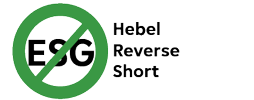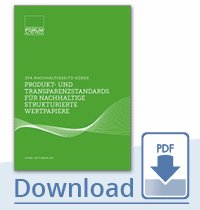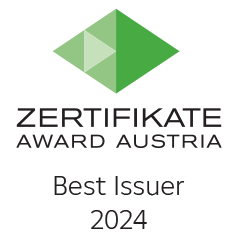Investing with Sustainable Certificates
![]() Climate change is one of the greatest challenges of our time, and we can only overcome it together. Everyone can make a contribution in everyday life, for example in terms of mobility and consumption. But we also want to set an example in financial terms!
Climate change is one of the greatest challenges of our time, and we can only overcome it together. Everyone can make a contribution in everyday life, for example in terms of mobility and consumption. But we also want to set an example in financial terms!
![]() We are aware of our social and ecological responsibility and want to make a contribution in terms of resource conservation, climate protection and social change. We therefore attach importance to designing some of our capital protection and partial protection certificates with sustainability in mind.
We are aware of our social and ecological responsibility and want to make a contribution in terms of resource conservation, climate protection and social change. We therefore attach importance to designing some of our capital protection and partial protection certificates with sustainability in mind.
![]() These investment products are assessed according to clear, objective criteria.
These investment products are assessed according to clear, objective criteria.
UN Global Compact: Raiffeisen Bank International is one of the signatory companies of the UN Global Compact
(UNGC). The UNGC is the world‘s largest initiative that supports companies in aligning their practices with a sustainable
and inclusive future. The ten principles of the UN Global Compact in the areas of labour standards, human
rights, environmental protection and anti-corruption make it clear which principles the participating organisations
must take into account.
UN Principles for Responsible Banking: Raiffeisen Bank International Group is the first Austrian banking group to officially sign the
UN Principles for Responsible Banking. This is a standardised framework for sustainable developed in an innovative global partnership
between banks and the United Nations Environment Programme Finance Initiative (UNEP FI). The Principles for Responsible
Banking define the role and responsibility of the banking sector and align it with the UN Sustainable Development Goals and the
Paris Climate Agreement of 2015.
Sustainability ratings: In addition to key financial figures, sustainability criteria are increasingly being included in investors' investment decisions. Analyses and ratings from specialised sustainability rating agencies - such as ISS ESG, Sustainalytics or Moody's ESG Solutions - as well as index providers provide orientation. Find out more about RBI's sustainability ratings:
Sustainability ratings and indices
Transparency: In accordance with the Taxonomy- and Disclosure Regulation of the European Union, we see the publication of the annual sustainability report as an important transparency and information tool in the dialogue with RBI stakeholders:
Austrian Ecolabel for Raiffeisen certificates
In April 2022, we were granted the Austrian Ecolabel. As an independent seal of quality with a high level of credibility and very high recognition value, the Austrian Ecolabel certifies ethically oriented projects and companies in the financial sector that generate profits through sustainable investments.
Our Sustainability Strategy
We are committed to strict, clear criteria when classifying our certificates. Whether a certificate is sustainable or not according to this set of rules is determined by means of an exclusion procedure. The key factors are:
![]() Product type - Is the certificate an investment product? (in the sense of the product classification of Zertifikate Forum Austria)
Product type - Is the certificate an investment product? (in the sense of the product classification of Zertifikate Forum Austria)
![]() Underlying - Is the index or the share(s) sustainable?
Underlying - Is the index or the share(s) sustainable?
In our sustainable investment products, we take into account environmental, social and responsible corporate governance (ESG) requirements. Our sustainability strategy also ensures that no environmental or social objective or principle leads to another being violated or even completely disregarded (known as the "do not significantly harm" principle).
Principal Adverse Impacts (PAI)
In the case of sustainable Raiffeisen Certificates, principal adverse impacts on sustainability (PAI) are considered:
- Consideration at the level of the issuer, i.e. Raiffeisen Bank International, derived from the sustainability report.
- Consideration at the level of the underlying asset, through compliance with the sustainability strategy and consideration of the sustainability standard.
The following Principal Adverse Impacts on sustainability can be taken into account:
 | Greenhouse gas emissions |  | Water conservation and consumption | |
| Species diversity (biodiversity) | Social, labour and human rights issues, including corruption and bribery | |||
 | Waste avoidance | |||
Criteria for Product Exclusion
Leverage products are generally categorised as non-sustainable because they typically have a short term and do not serve any medium or long-term investment objectives. Investment products that specifically profit from falling prices (reverse or short certificates) are also considered unsustainable. Please see product classification of Zertifikate Forum Austria
Analysis of the underlyings
- Sustainable stock indices are developed in cooperation with recognized index providers (e.g. MSCI).
- For individual stocks as the underlying asset, we use the sustainability analysis from Raiffeisen Research to select stocks for our sustainable investment products.
Criteria for the Exclusion of the Underlying
We explicitly exclude certain underlyings from sustainable investment products. These include state issuers that are categorised as unfree by Freedom House due to the current human rights situation. In addition, soft commodities are excluded as underlyings. We have also set strict turnover limits for certain economic activities. Values from Raiffeisen Research or other reputable data providers are used for the exclusion procedure.
Excluded are companies that ...
| ... violate human rights and especially the above-mentioned UN Global Compact Principles. | |
| ... derive more than 25% of their revenue from coal mining. | |
| ... generate more than 10% of their revenue from armaments. | |
| ... generate more than 5% of their revenue from tobacco. | |
... derive more than 10% of their revenue from nuclear power. |
Our Sustainability Standards
Sustainable underlying - sustainable issuer - sustainable certificate: This is the chain on which the sustainability standards for Raiffeisen certificates and our sustainable activities are based. We also ensure compliance with the Sustainability Code of the Certificates Forum Austria - that is a matter of course.
Sustainability Code of the
Certificates Forum Austria (ZFA):
At Austrian industry level, the issuers represented in the ZFA have also agreed on product and transparency principles accoding to the criteria for sustainable investments with certificates.
Further information at www.zertifikateforum.at.
Sustainable Underlyings
The following indices with sustainability relevance are used for sustainable Raiffeisen Certificates:
| Index | Composition (as of June 2024) | Region | Investment products |
| MSCI® World Climate Change Top ESG Select 4.5% Decrement | over 240 shares | global | Certificates → |
| MSCI® World Top ESG Select 4.5% Decrement | over 410 shares | global | Certificates → |
| MSCI® Europe Top ESG Select 4.5% Decrement | over 100 shares | Europe | Certificates → |
| MSCI® Emerging Markets Top ESG Select 5% Decrement | over 330 shares | emerging markets | Certificates → |
| MSCI® North America Top ESG Select 4.5% Decrement | over 210 shares | North America | Certificates → |
| DAX® 50 ESG (PR) EUR | 50 companies | Germany | Certificates → |
Raiffeisen Certificates with sustainable indices as underlying fully take into account the exclusion criteria according to the sustainability standards for Raiffeisen Certificates, including Principal Adverse Impacts (PAI).
LEGAL NOTICE
Sustainable Raiffeisen Certificates take into account the main adverse effects on sustainability factors (PAI) according to Art. 2 No. 7 lit. c) MiFID II-DVO, (EU) 2021/1253. However, these are not financial products within the meaning of Regulation (EU) 2019/2088. This is advertising which does not constitute investment advice, an offer, a recommendation or an invitation to make an offer. Comprehensive information on the financial instrument and its opportunities and risks - see approved (base) prospectus (including any supplements), published at raiffeisenzertifikate.at/securitiesprospectuses. Additional information also in the basic information sheet and under "Customer information and regulatory matters" raiffeisenzertifikate.at/customer-information. The approval of the prospectus is not to be understood as an endorsement of this financial instrument by the authority (FMA). You are about to acquire a product that is not simple and may be difficult to understand. We recommend that you read the prospectus before making an investment decision. When purchasing the financial instrument, the investor bears the credit risk of Raiffeisen Bank International AG (RBI). The certificate is subject to special regulations which may already have an adverse effect in the event of a probable default of RBI (e.g. suspension of interest payments) - see raiffeisenzertifikate.at/bail-in







 Top Pick
Top Pick 




